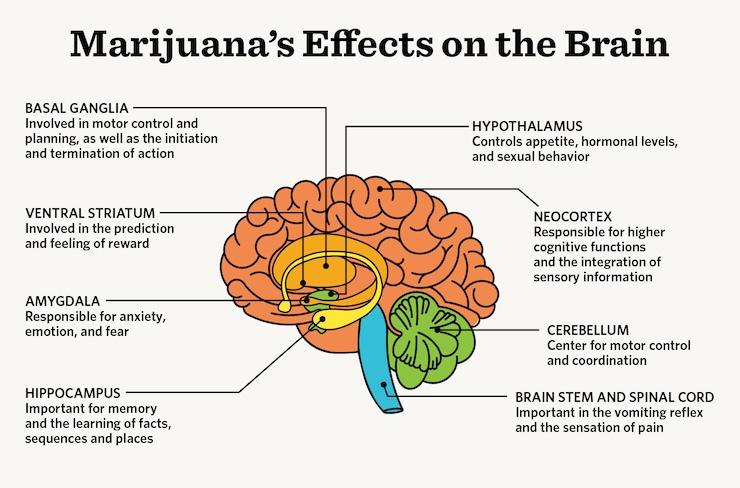As the spotlight continues to shine on cannabis and its myriad compounds, tetrahydrocannabinol (THC) stands out as one of the most recognized and discussed. While many celebrate its psychoactive properties and potential therapeutic benefits, it’s essential to explore the other side of the coin: the side effects that can accompany its use. As individuals navigate the evolving landscape of cannabis consumption, understanding the diverse array of effects THC may induce—both pleasant and adverse—becomes crucial. In this article, we will delve into the complexities of THC side effects, unraveling the science behind them and offering insights to help users make informed choices about their cannabis experiences. Whether you are a seasoned connoisseur or a curious newcomer, join us as we uncover the truths that lie within this controversial compound.
Table of Contents
- Understanding Short-Term Effects of THC Use
- Exploring Long-Term Implications for Mental Health
- Managing Anxiety and Paranoia: Tips for Users
- Navigating the Legal Framework and Its Impact on Consumption
- Q&A
- To Wrap It Up
Understanding Short-Term Effects of THC Use
THC, or tetrahydrocannabinol, interacts with our endocannabinoid system, producing a range of short-term effects that can vary significantly from person to person. Upon consumption, individuals may experience sensations of euphoria, increased sensory perception, and altered mood states. These immediate effects can include:
- Heightened sensory awareness: Colors may appear more vibrant, and sounds may be more pronounced.
- Increased appetite: Commonly referred to as the “munchies,” users often feel an intense craving for food.
- Anxiety or paranoia: Some may experience heightened levels of anxiety or feelings of paranoia, especially with higher doses.
Additionally, THC can impact cognitive functions temporarily. Memory retention, attention span, and coordination might be impaired, leading to challenges in performing tasks that require focus or precision. This impairment can manifest through:
- Short-term memory loss: Difficulty recalling recent events or information.
- Delayed reaction times: Slower responses to stimuli can hinder activities like driving.
- Altered perception of time: Time may feel stretched or compressed, leading to potential misjudgments.
Exploring Long-Term Implications for Mental Health
As research continues to unfold, the long-term effects of THC consumption on mental health remain a point of significant discussion. While some users report therapeutic benefits, emerging evidence points to potential adverse outcomes, particularly with prolonged usage. Common findings suggest a correlation between high THC intake and issues such as:
- Anxiety Disorders: Chronic use may exacerbate feelings of anxiety in some individuals.
- Depressive Symptoms: Long-term users could experience increased risks of depression.
- Cognitive Impairment: Prolonged exposure could affect memory and decision-making capabilities.
- Potential Psychosis: In susceptible individuals, high THC levels may trigger or worsen psychotic disorders.
In evaluating these implications, it’s vital to consider various factors including dosage, frequency, and individual predispositions. A study overview highlights these distinctions:
| Factor | Impact on Mental Health |
|---|---|
| Low Dosage | Minimal cognitive impact; potential therapeutic effects |
| High Dosage | Increased risk of anxiety, depression, and psychosis |
| Frequency of Use | Habitual use linked to significant mental health challenges |
| Individual Vulnerability | Pre-existing mental health conditions may exacerbate risks |
Managing Anxiety and Paranoia: Tips for Users
Experiencing anxiety and paranoia can be daunting, especially for those who use THC products. It’s essential to acknowledge these feelings and find effective strategies to manage them. One helpful approach is to create a calm environment. Consider the following tips:
- Engage in mindfulness practices such as meditation and deep breathing exercises to ground yourself.
- Surround yourself with trusted friends or family members who can provide support and reassurance.
- Limit overstimulation, such as bright lights or loud noises, which can exacerbate feelings of anxiety.
If anxiety or paranoia does arise, it’s crucial to identify quick coping strategies to regain control. Here are some effective techniques to keep in mind:
- Focus on your breath: Inhale deeply and exhale slowly, allowing your mind to settle.
- Redirect your thoughts by engaging in a different activity that you enjoy, such as reading or listening to music.
- Keep a journal to express your feelings and thoughts, helping to externalize what you’re experiencing.
| Situation | Coping Strategy |
|---|---|
| Feeling Overwhelmed | Take a short walk outdoors |
| Racing Thoughts | Practice gratitude by listing five positive things |
| Physical Tension | Try gentle stretching or yoga |
Navigating the Legal Framework and Its Impact on Consumption
The legal landscape surrounding cannabis consumption is continually evolving, directly affecting how consumers interact with THC products. As regulations shift, what may be legal in one jurisdiction could be entirely prohibited in another. This dynamic environment creates a host of considerations for users, including dosage guidelines, safety standards, and marketing practices. Understanding local laws is crucial for anyone considering THC consumption. Factors such as age restrictions, qualifying conditions for medical use, and the nuances of recreational vs. medicinal use play a significant role in shaping the consumption experience.
Moreover, the impact of this legal framework extends beyond mere compliance; it influences consumer behavior and perceptions. For instance, as more states legalize cannabis, there’s a noticeable shift in public attitudes towards THC usage. While increased availability may encourage a more open dialogue about its effects, including potential side effects like anxiety or altered cognitive function, it can also lead to misinformation and stigma that persists in some circles. The level of education provided by regulatory bodies is crucial in assisting consumers to make informed decisions, ultimately fostering a responsible approach to THC consumption.
Q&A
Q&A on THC Side Effects: What You Need to Know
Q1: What is THC, and how does it affect the body?
A: THC, or tetrahydrocannabinol, is the primary psychoactive compound found in cannabis. When consumed, it interacts with the body’s endocannabinoid system, particularly binding to CB1 receptors in the brain. This interaction is responsible for the “high” often associated with marijuana use, but it can also lead to a variety of side effects.
Q2: What are the common side effects of THC?
A: Common side effects of THC can include dry mouth, red eyes, increased appetite (often referred to as “the munchies”), and altered perception of time. These effects can vary greatly from person to person, depending on individual tolerance and dosage.
Q3: Are there any psychological side effects associated with THC use?
A: Yes, THC can lead to psychological side effects such as anxiety, paranoia, and mood swings. In some individuals, especially those predisposed to mental health issues, THC may exacerbate symptoms or trigger episodes of psychosis. It’s essential for users to be aware of their mental health history and to consume responsibly.
Q4: Can THC affect memory and cognitive function?
A: Research suggests that high doses of THC, especially in inexperienced users, can impair short-term memory and cognitive function temporarily. While these effects are often mild and short-lived, they can hinder tasks that require focus or recall, such as driving or studying.
Q5: Are there any long-term side effects of regular THC use?
A: Long-term use of THC can lead to changes in brain function and may potentially contribute to issues like cannabis use disorder in some individuals. There is ongoing research into its impact on lung health, particularly for those who smoke cannabis regularly. It’s crucial to approach consumption with caution and awareness of your body’s responses.
Q6: Is it safe to mix THC with other substances?
A: Mixing THC with other substances, such as alcohol or certain medications, can amplify side effects and lead to unpredictable responses. For instance, combining THC with alcohol may increase sedation and impair motor skills even further. Consultation with a healthcare professional is advised if you consider combining substances.
Q7: What can I do to mitigate the side effects of THC?
A: Start with a low dose and gradually increase as needed to find your optimal level. Staying hydrated, eating before consumption, and seeking high-CBD strains may help offset some side effects like anxiety and paranoia. Being in a comfortable environment and around supportive friends can also make the experience more enjoyable.
Q8: How can I be more informed about the effects of THC?
A: The key to understanding THC and its effects is research. Consult reputable sources, speak with healthcare professionals familiar with cannabis, and consider joining discussions in responsible cannabis communities. Awareness and education can empower you to make informed choices regarding your cannabis use.
Q9: Are there alternatives to THC for managing symptoms?
A: Yes, there are non-psychoactive alternatives, such as CBD (cannabidiol), that may provide therapeutic benefits without the intoxicating effects of THC. Many individuals find relief from pain, anxiety, and inflammation using CBD without the associated side effects of THC. As always, consult a healthcare provider for tailored advice.
Q10: Is it safe to use THC for medicinal purposes?
A: For many, THC can provide significant relief for various medical conditions, including chronic pain, nausea from chemotherapy, and appetite stimulation for those with eating disorders. However, it’s important to work closely with a healthcare provider to determine the appropriate dosage, method of consumption, and to monitor any potential side effects. Individual needs can vary widely, making professional guidance crucial.
Conclusion:
Understanding THC and its side effects is essential for responsible use, whether for recreational or medicinal purposes. Stay informed, consult professionals, and prioritize your health and well-being while navigating the world of cannabis.
To Wrap It Up
As we draw the curtain on our exploration of THC and its potential side effects, it’s vital to acknowledge that cannabis, much like any other substance, invites a spectrum of experiences. With its rising popularity, understanding the balance between its therapeutic benefits and its possible drawbacks becomes increasingly important. Whether you’re a casual user or considering its use for medicinal purposes, staying informed empowers you to make choices that align with your well-being. As research continues to unfold, the conversation around THC is sure to evolve, encouraging ongoing dialogue about its implications in our lives. Remember, every journey with cannabis is unique—what works for one may not work for another. As you navigate this path, may you do so with insight and intentionality, guiding your own experience with knowledge and care.


